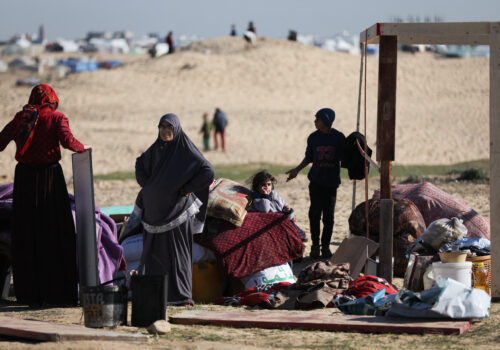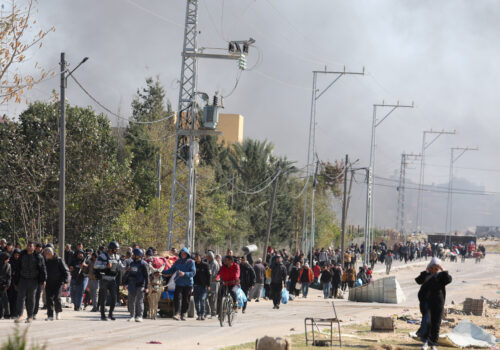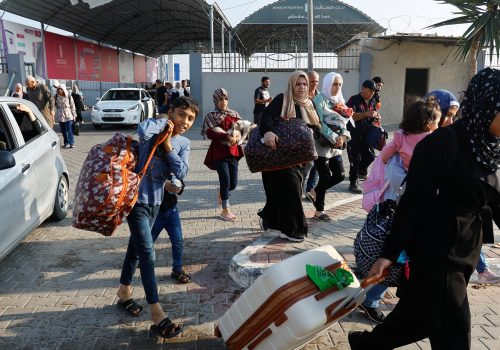Houthi attacks on ships in the Red Sea add to Egypt’s economic troubles
As the Red Sea crisis prompted by the Gaza War enters its fourth month with no sign of a breakthrough, Egypt—which relies on Suez Canal revenues as one of its primary sources of foreign currency—has been hit hard. Attacks on ships in the Red Sea by Iran-backed Houthis in Yemen have caused major shipping companies to divert their vessels from the vital waterway to alternative routes, albeit longer and more expensive ones.
The Houthi militants have described their attacks on commercial vessels as “an act of self-defense.” They claim they are attacking ships suspected to be linked to Israel or those that are heading to or from there. The Houthis believe that the disruption of global trade will pile pressure on the international community to coerce Israel into accepting a ceasefire in the Gaza war which has killed nearly 27,000 Palestinians since October 7, 2023. Instead, since January 11, the United States and the United Kingdom have launched a series of airstrikes against Houthi targets in a major escalation described by some analysts as a US-Iran proxy war in Yemen.
According to Osama Rabie, head of the Suez Canal Authority, the diversion of ships has resulted in a 40 percent drop in Suez Canal revenues in early January compared to the same period last year. The losses are significant, amounting to “hundreds of millions of dollars,” per International Monetary Fund (IMF) managing director Kristalina Georgieva. The decline in canal revenues—which account for 2 percent of the country’s gross domestic product (GDP)—has put further strain on Egypt’s already faltering economy at a time when the country faces a severe foreign currency shortage. Egypt badly needs the hard currency to import wheat and other goods and to repay its staggering foreign debt, which reached $164.5 billion in September 2023, $29 billion of which is due for repayment this year.
And, no, tourism revenues won’t compensate for the Suez Canal revenue losses. The tourism sector—another of Egypt’s main sources of foreign currency—has also been dealt a blow by the ongoing war in the Gaza enclave, which shares Egypt’s northern border. The American credit ratings agency Standard & Poor has predicted that the tourism sector in Egypt—along with Lebanon and Jordan— could suffer the most from the ongoing war, hampering GDP growth and “weakening the country’s external position.”
Egypt’s gas exports have also suffered over the past year. Aging gas fields and upstream issues have resulted in a 10 percent year-over-year decline in gas production during the first eight months of 2023. This starkly contrasts with the previous year, when Egypt had exported 80 percent of its Liquefied Natural Gas (LNG) to Europe, stepping in to replace Russian pipeline gas in the wake of Russia’s onslaught on Ukraine.
To meet high domestic demand over the summer, Egyptian gas has been used for local consumption with no surplus left for export. The outbreak of the Israel-Hamas war in the neighboring Gaza Strip on October 7, 2023 has aggravated the problem: Israel’s gas exports to Egypt dropped by 70 to 80 percent in the weeks after the war—Israel shut down its Tamar gas field off its southern coast to safeguard it against potential attacks from Hamas—compared to the first eight months of 2023. The month-long shuttering of the gas field resulted in a halt in exports through the underwater EMG pipeline. Fortunately for Egypt, gas production at Tamar resumed in mid-November 2023. Egypt subsequently restarted its LNG exports to Europe, with the first shipment leaving its LNG export terminal at Idku on November 21, 2023. In December 2023, ABN Amro reported that Egyptian imports from Israel were back to pre-war levels.
SIGN UP FOR THE THIS WEEK IN THE MIDEAST NEWSLETTER
Meanwhile, according to the Central Bank of Egypt, remittances from Egyptians working abroad fell by nearly 30 percent during the third quarter of last year (July-September 2023). Analysts attribute the drop to a lack of confidence in the Egyptian economy and the existing dual foreign currency exchange rate: one US dollar is equivalent to nearly thirty-one Egyptian pounds when exchanged in banks, but sells for nearly double the value on the black market.
The Egyptian pound has already lost more than half its value in a series of devaluations of the currency—part of a package of economic reforms (including moving to a flexible exchange rate) conditioned by the IMF in 2016 to allow Egypt to secure a $12 billion rescue package to restore investors’ confidence in the economy. Prices of essential commodities, including food and fuel, have since soared, with inflation at 33.7 percent in December 2023; and public discontent—and the risk of instability—rising.
The government, which has been dragging its feet in carrying out the painful but necessary reforms it agreed to at the time the IMF deal was sealed in 2016, is left with no option but to comply with the IMF loan conditions, which include free flotation of the currency, and will reduce the state’s economic footprint by enhancing private sector participation—in other words, it will level the playing field for all economic actors.
In 2022, Egypt secured nearly $3 billion of new financing from the IMF. Still, that deal has been at a virtual standstill pending progress in the conditioned reforms, which include a flexible exchange rate and the accelerated sale of military-owned companies to private investors. One economic analyst who chose to remain anonymous told me he believed the 2024 presidential elections were brought forward to December 8-10, 2023 because the Abdel Fattah el-Sisi government had been reluctant to announce another currency devaluation before the vote, fearing the decision may spark social unrest.
Meanwhile, per Ahram Online, Georgieva said that Egypt and the IMF have continued to try to reach an agreement on “systematic adjustments to state policies;” she added that the two sides were “very close” to agreeing on the implementation details of Egypt’s economic reform program. According to the global credit rating agency, Moody’s, the adjustments would allow for “expansion of the IMF loan program to $10 billion” to help Egypt overcome its enormous challenges and bridge its widening financial gap.
It looks like Cairo has woken up to the realization that it needs to urgently deliver on its promises of reforms to the IMF to avert further economic disaster. Even as the IMF talks were ongoing in Cairo, the Central Bank of Egypt announced a 2 percent hike in interest rates as of February 1, signaling that another currency devaluation is in the offing. While the decision may infuriate the majority of Egyptians—30 percent of whom live below the poverty line—it is a bitter pill that must be swallowed. The alternative is an Argentina– 2001 scenario with Egypt defaulting on its foreign debt.
Amid heightened social tensions due to the skyrocketing prices of basic commodities and the possibility of social unrest, Cairo has already braced itself for a major cabinet reshuffle, a source close to the government told me. A change of government would allow President Sisi to remain in power and continue the harsh austerity measures introduced in 2016. Sisi, however, needs to put the brakes on grandiose projects that many Egyptians consider unnecessary and revisit some of his controversial policies that have led Egypt to where it is today. Egyptians find themselves having to foot the bill for what many describe as “the mismanagement of the economy,” “state monopoly,” and decades of “preferential treatment for military agencies.”
Despite the general harmful implications of the Gaza war and the Houthi attacks, in particular, Cairo has refused to partake in military operations against the Houthis, calling them “a dangerous development” that threatens to destabilize the region. Rather than take action to deter the militant group, Cairo has urged the Houthis to focus their attacks only on Israeli ships, the London-based Al-Araby Al-Jadeed has reported. This lack of action by the Egyptian leadership is likely due to fear of being perceived by Egyptians—the majority of whom sympathize with the Palestinians—as siding with Israel.
Egypt, meanwhile, is doing all it can to mitigate the economic harm caused by the reduced traffic through the Suez Canal, including by raising transit fees by 10 to 15 percent starting mid-January. Cairo has also intensified its mediation efforts to end the conflict.
Nevertheless, the longer the war continues, the greater the toll it will take on Egypt’s troubled economy and the higher the risk of social unrest—regardless of whatever emergency measures Egypt takes.
Shahira Amin is a nonresident senior fellow at the Atlantic Council’s Scowcroft Middle East Security Initiative and an independent journalist based in Cairo. A former contributor to CNN’s Inside Africa, Amin has been covering the development in post-revolution Egypt for several outlets, including Index on Censorship and Al-Monitor. Follow her on X: @sherryamin13.
Further reading
Wed, Jan 10, 2024
Egypt was mediating a deal to end the Gaza war. Then Saleh Al-Arouri was assassinated.
MENASource By Shahira Amin
Keen on regaining its traditional leadership role as chief mediator between Israel and the Palestinians, Cairo had put forward a three-stage plan to end the conflict.
Thu, Jan 25, 2024
Can whatever remains of Hamas in Gaza be administratively and politically rehabilitated?
MENASource By Ahmed Fouad Alkhatib
The realities on the ground and Israel’s inability to fully eradicate Hamas necessitate addressing this uncomfortable question.
Fri, Nov 3, 2023
As the Gaza war continues, Egypt is facing pressure to act
MENASource By Shahira Amin
As Israel expands its ground raids in the Gaza Strip, Egypt is witnessing the ripple effects of the war and faces growing pressure to act in regard to Palestinian refugees.
Image: FILE PHOTO: People walk on the beach as a container ship crosses the Gulf of Suez towards the Red Sea before entering the Suez Canal, in El Ain El Sokhna in Suez, east of Cairo, Egypt April 24, 2017. REUTERS/Amr Abdallah Dalsh/File Photo



